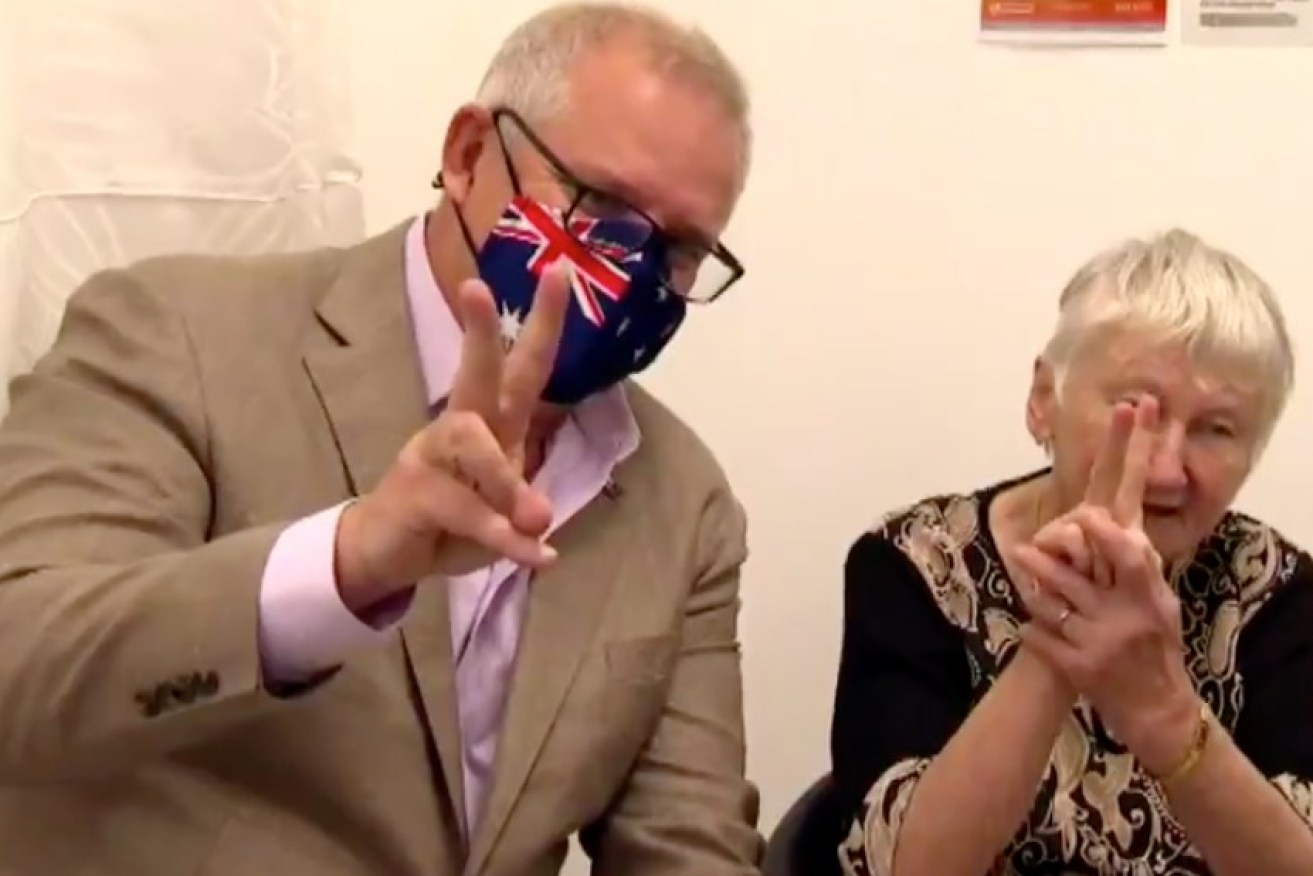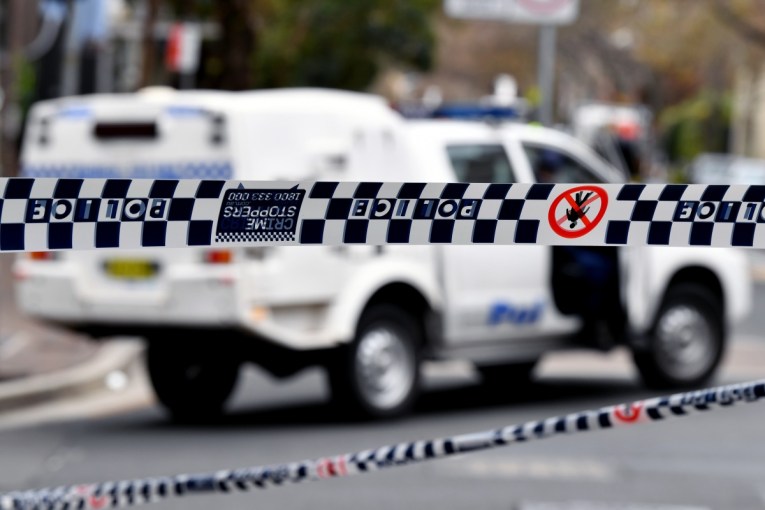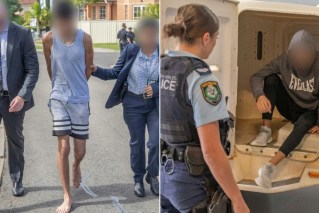Vaccinations begin as Morrison among first to get Pfizer jab


Scott Morrison with Jane Malysiak, the first person in Australia to get a COVID vaccination. Mr Morrison was the second.
An aged care resident who survived World War II has become the first person in Australia to receive a COVID vaccine, shortly followed by Prime Minister Scott Morrison, as the nation’s vaccination program finally begins.
The PM visited a medical centre at Castle Hill, in Sydney’s north-west, to join a group of aged care residents, medical staff and border workers in being vaccinated.
Aged care resident Jane Malysiak, aged 84, was the first person in Australia to get a vaccine. Mr Morrison sat alongside her, as she rolled up her sleeve and received the Pfizer injection.

Scott Morrison receives the Pfizer jab on Sunday. Photo: AAP
The first stage of vaccine distribution was due to start widely on Monday, with the symbolic first group on Sunday comprised of members from all cohorts included in Phase 1a of the rollout plan.
Some 60,000 Australians – high-risk workers in health and quarantine spaces, and aged care residents – are expected to be vaccinated in aged care homes and hospitals this week.
“I have, by my own example today, joined by the chief nurse and the Chief Medical Officer of our country, together with those Australians who are in the top priority of this vaccination program, to say to Australians, it’s safe,” Mr Morrison said.
“It’s important. Join us.”
https://twitter.com/tegangeorge/status/1363282281037631494
There was a light-hearted moment as Mr Morrison encouraged Ms Malysiak to put up two fingers in a “V for vaccine” hand gesture, and she briefly flashed the symbol backwards – considered an offensive gesture by some.
Mr Morrison joined chief medical officer, Professor Paul Kelly, and chief nursing and midwifery officer, Alison McMillan, were also among the first group to get the jabs on Sunday.
“I am here in solidarity. I am not asking for anyone to do something that I am not prepared to do myself,” Professor Kelly said.
The government trio would normally not have been included in this early stage under the rollout plan, and likely would have been in Phase 2a under regular circumstances. However, Health minister Greg Hunt said on Sunday it was important for the public figures to receive jabs in the first group “in order to provide confidence”.

Scott Morrison and Jane Malysiak as she receives her vaccine. Photo: AAP
“There was a very strong focus on the need for key leaders, not the Parliament, not the Cabinet, not even the leadership group, but a cross-party group, to provide that confidence,” Mr Hunt told the ABC’s Insiders program.
“That has been a view in many places around the world.”
British Prime Minister Boris Johnson and American President Joe Biden were among the first people vaccinated in their countries.
The people vaccinated on Sunday will have to receive their second shot of the two-dose Pfizer vaccine in three weeks’ time.
Mr Hunt said he and health department secretary Brendan Murphy would receive the AstraZeneca vaccine in the near future. He also added that Labor leader Anthony Albanese, Greens leader Adam Bandt, and a “very small” number of others had been invited to receive a vaccine in the early stages.
The New Daily understands Labor and the Greens have received the invitations and are planning when and where they will have their injections – potentially as early as this week.

Australia’s vaccine roadmap. Photo: Department of Health
“This is a cross-parliamentary view where parliamentarians don’t have any special status,” Mr Hunt said.
“The Cabinet or shadow cabinet doesn’t, nor even does the leadership. It is about the confidence and indeed the research shows that people want to see that if we believe it’s safe, then that will give them greater confidence.”
Government sources have told The New Daily that vaccine hesitancy and anti-vaxxer sentiment is a real concern in the rollout. A health department poll, released last week, showed 27 per cent of Australians were “unsure” about getting a vaccine, while another nine per cent said they “definitely” wouldn’t get one.
Less than half of Australians said they planned to get a vaccine as soon as possible.
The first group received the Pfizer jab, of which Australia has secured enough supply for 10 million people; but the government has said most Australians will likely receive the AstraZeneca vaccine, of which Australia has enough for 26 million people.
The Pfizer vaccine has a higher efficacy rate than AstraZeneca, but health officials have stressed both are very effective and safe. Australia does not currently have access to AstraZeneca doses, but a first shipment from overseas is expected in early March.
“This was the first that was available, and so the plan was always that the Prime Minister, myself and Professor McMillan would be the first to get that vaccine,” Professor Kelly said on Sunday.
“I can absolutely guarantee that had that first vaccine been AstraZeneca, I would have had that one.”
Mr Morrison said the government hoped people would gain confidence in the vaccine as the rollout plays out.
“I think as time goes on and as people see the benefits, as we are already starting to see in other countries that have gone down this
path, I would expect to see confidence continue to lift,” he said.
“We have one of the highest rates of vaccination in the world generally, when it comes to other vaccines. So Australia has good form on this.”
When asked how Australian society may start going back to pre-COVID conditions as the vaccine rollout progresses, the PM said “every day that goes past from here gets more normal”.
Mr Hunt said that “confidence” would be the most important change.
“Today is about confidence and hope and protection above all else. That will lead to shops and schools being progressively more and more open, and other activities around the country,” he said.
“In the later stages… engagement with the outside world is something that happens, perhaps on a more staggered basis. But what changes today is confidence goes up.”
More to come.







